Big Dreams Little Tokyo: A Half Japanese Comedy
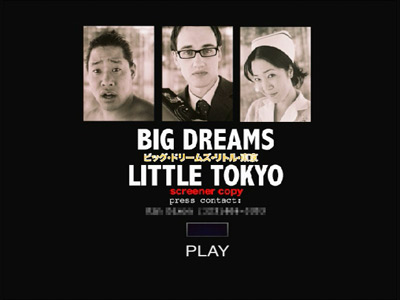
For Screening Purposes Only
Big Dreams Little Tokyo (IMDb entry) is one of those movies that seek to explore the meaning of culture in today’s globalizing world that serves as a melting pot of ethnic identities. It has been making its way around various independent film festivals and has received many positive reviews. Two weeks ago, Mr. Dave Boyle, the director and also the lead actor, presented me with an opportunity to review the movie before its DVD and theatrical release in America next year. Of course I was not the only blogger offered to do this, but I did feel a tingle of joy to receive such a request.
Two weeks later, I’m sitting in my room with the screener DVD (digitally watermarked to prevent piracy) in hand and a movie review to write. So here we go.
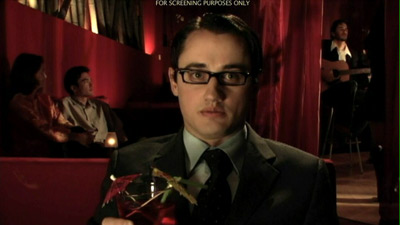
“The rain in Spain falls mainly on the plain.”
The story is about Boyd, an American who speaks fluent Japanese, and his dream of success as a businessman. He wrote a book which teaches English to Japanese speakers and he runs his own one-person company (his apartment) where he conducts English lessons. He spends his days going from house to house to promote his book and he frequently gets chased out of the book store’s owner for trying to peddle his goods in the store. He lives with a 200-pound Japanese American guy called Jerome who spends his time putting on weight and learning Japanese because he wants to be a professional sumo wrestler.
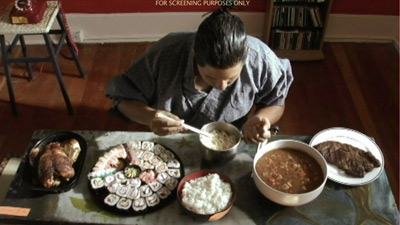
“Just…another…20…pounds.”
In a way, this film reminds me of Lost in Translation, except it doesn’t really deal with Japanese culture. It has a lot of “Japan” element in it and indeed Japanese plays an important role in the story, but it’s not a movie that deals with Japan and its culture the way Translation did. It’s really a movie about ethnic identity in today’s generation, with Japanese being used as a device to tell that story. Or at least that’s what I think anyway.
Besides the main character and his room mate, we get to meet a Mexican who works as a sushi chef, a Japanese corporate boss who likes to shake hands instead of bow and various other characters who seem somewhat out of place in their roles. It is through the (often humorous) interactions between this cast of cultural misfits that we, the viewers, get to enjoy an interesting commentary on the way we think about our own racial identities in today’s world.
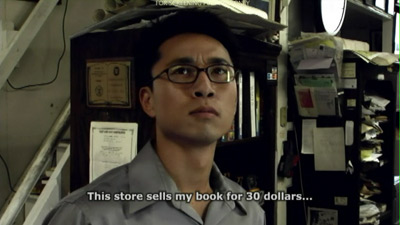
“I should be saving the world in New York right now.”
Interesting side note: James Kyson Lee, who plays Ando in the hit TV series Heroes, is an angry shopkeeper in the movie. He doesn’t really do much, but it’s kind of cool considering how I just started watching Heroes recently. LOL. Actually the shopkeeper is also quite fascinating because he’s clearly Japanese but he always speaks English and he hates it when Boyd speaks Japanese to him. In a way, he seems to have rejected part of him, perhaps in his attempt to integrate himself into American society.
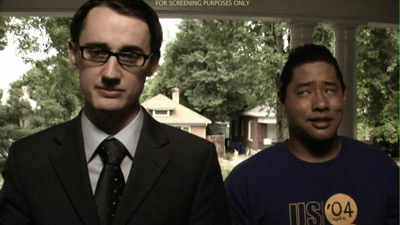
“Good day, would you like to learn English?”
While nominally a comedy, it’s not the kind of “Jim Carrey” humour that’s commonplace in cinemas today. It’s subtle in execution, perhaps too subtle sometimes. Much of the dialogue is in Japanese, and some of the jokes make use of it. For example, in the opening scene of the movie, Boyd is trying (but failing) to convince three drunken Japanese businessmen to buy his book. They are more amused by his command of Japanese and one of them asks him to say “this morning, every morning” in Japanese. If you don’t speak Japanese, it’s a little hard to get this joke. Basically, it’s “kesa maiasa” (今朝毎朝), which sounds like “kiss my ass” when you say it out loud. There’s also a tako/taco joke in a later part of the story.
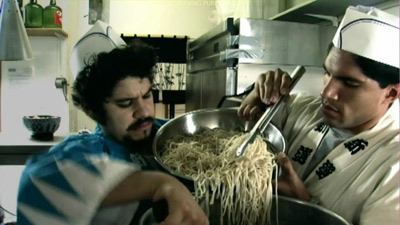
Two Mexican chefs preparing udon.
As Boyd and Jerome try to achieve their dreams, they face the challenge of overcoming social prejudices due to their unique circumstances. Boyd has trouble making people take him seriously because they are too busy getting excited over his fluent Japanese. Jerome feels like he’s too American to be a sumo wrestler and at the same time too Japanese to really be American. In one scene, two guys from Okinawa refuse to take English lessons from Jerome because he’s not white, despite the fact that he speaks perfectly accented English.
Along the way, Boyd meets a Japanese nurse, Mai, who wants to improve her English and ends up taking lessons from him. Hilarity and some light drama ensue. With her help, difficulties are resolved and eventually Boyd and Jerome learn to come to terms with both sides of their identities and everyone lives happily ever after. Or something like that.
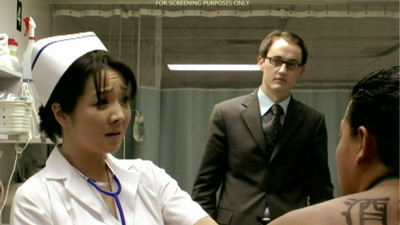
“She’s hot!”
One of my favourite scenes happens near the end, when Boyd and the Mexican Japanese chef ends up as interpretors for a takeover negotiation between a Mexican factory owner (who bears an uncanny resemblance to George W. Bush) and representatives of a Japanese corporation. Unhappy differences are resolved thanks to some creative interpreting by them. This reminded me of a scene in Lost in Translation where the director passionately gives out instructions to Bob, the main character, in Japanese and his interpretor condenses everything into brief translations that lose their original meanings.
The Mexican factory owner and the Japanese salarymen eventually hit it off despite the cultural and language barriers, with a little help from the universal male language: alcohol. It’s a pretty entertaining scene.
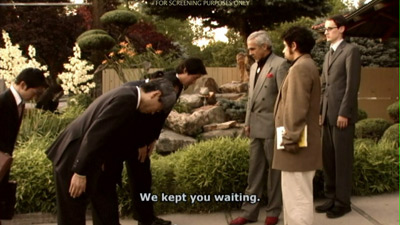
It’s like one of those yakuza movies…except with some Mexicans.
It’s also very interesting to note that throughout the movie, there’s no direct mention of where it is set in. Indeed, from the first few scenes it seemed like the movie was set in Japan. I was somewhat confused when Boyd said that his book cost eighteen dollars because it’s kind of weird for people to use dollars in Japan. It is only later in the film where you see signs that say “Japantown” and even then we never get to find out which Japantown it is. I think this is a very clever set-up because it really makes you realize just how we perceive the world through stereotypes that can turn out to be very wrong in this age of rampant cultural cross-pollination. Or perhaps it was completely unintentional and I’m just reading too much into it. LOL.
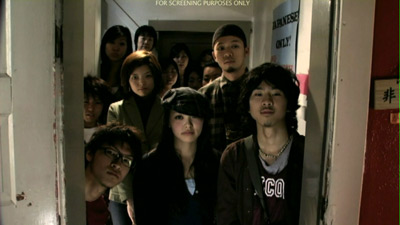
My girlfriend thinks that the girl in the middle is cute.
In conclusion, it’s a great movie! Having studied Japanese for the past five years, I find that the film really resonated with the way I feel. I’ve always been a supporter of cultural globalization and I think that the movie did an excellent job of telling that story in a light-hearted and digestible manner. I especially loved the final scene which I find to be the perfect cumulation of the film’s messages, but I shall refrain from describing it. You’ll just have to watch it for yourself when the movie is released in early 2008! Meanwhile, I have to mail the DVD back.
P.S. I wish more movie directors would send me their works for pre-release reviews. Steven Spielberg, I’m looking your way! ;)
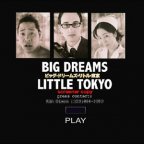






September 6th, 2007 at 12:44 am
I wonder if it’ll ever be released/shown in Singapore… I’ll definitely watch it, tho it looks like the “buy the DVD stay home and watch – not worth the DIGITAL CINEMA SURROUND SOUND systems” kind of movie.
September 6th, 2007 at 12:51 am
This actually sounds pretty interesting…
I will have to look out for it when it comes out…
September 6th, 2007 at 3:22 am
I’ve been anticipating this movie for a long while. *sigh* I’m sure the press screenings are somewhat selective, so I doubt I’ll be able to jump on that train.
I’m really rather upset that this movie is not released yet. I’m not upset with the creators, but with the antiquated, inefficient, customer-infuriating system that they’re having to be a part of in order to market the movie.
Imagine how different things would be if they could have gone straight to independent digital distribution.
September 6th, 2007 at 8:41 am
Thanks for the review; you’ve definitely piqued my interest. I’ll be sure to check this film out once it makes over to U.S. shores. :)
September 6th, 2007 at 9:25 am
I can’t wait to see it next year!
September 6th, 2007 at 1:13 pm
Ah. Damn, I sooo want to watch this film and use it for my film form review class.
Japantown btw, is in Sydney, Australia.
September 6th, 2007 at 1:20 pm
Not true… He was inspired by the Sydney Japantown, but the movie clearly takes place in America. Japantown is a common name like Chinatown anyway.
September 6th, 2007 at 5:08 pm
Ooh, I hadn’t actually even heard about it. But since I’m in Australia, that’s not surprising. D: I’m going to check it out, whether it’s at the art-house cinema or on DVD.
September 6th, 2007 at 6:10 pm
MY GIRLFRIEND THINKS THE GIRL IN THE MIDDLE IS CUTE.
September 6th, 2007 at 7:28 pm
Ok.. the review had get me going and I feel like watching it now!! I cant wait for 2008 to come!
September 7th, 2007 at 12:15 am
Wow, thanks for the heads up. It’s a fresh movie to begin with.
To be honest with you, the potential for this movie to become a basis for film and media class discussion is extremely high, for three reasons:
1. The impact of globalization on culture. It complements The Straits Times’ Life article about the same subject.
2. Stereotypes. Like you said, this setting MIGHT be set outside Japan, who knows. Again, it’s how globalization destructures (or restructures) known stereotypes.
3. Play on current trends. It seems that the Japanese language and/or culture is/are becoming more mainstream, so there are more issues pertaining to the so-called “usurping of traditional, Western-oriented” “West” culture to a more “Japanese-like” culture.
Wow, I can see this coming. I like discussions. Once again, thanks for the heads up.
September 7th, 2007 at 1:01 am
I’m just LOL that DM got cited on the movie’s home page.
MASSIVE CREDS FOR YOU LAD!
As for the film itself, sounds interesting and it’s good to hear that non-white, non-American people can enjoy it just as well.
September 7th, 2007 at 1:56 am
Cool… sounds like an interesting movie… Will keep an eye out for it :) Hopefully it comes out in DVD though…. otherwise, think i might have trouble convincing ppl to watch with me.. :’(
Will be something different from what i usually watch too ^_^
September 7th, 2007 at 5:33 am
Hey! Thanks for the good review. Glad you liked it. Posted a link to your blog on the press page for the movie.
A side note: I was indeed inspired by the Sydney Japantown, but the one in the movie is a combination of San Jose, San Francisco and Salt Lake City (oddly enough, there used to be a Little Tokyo in Utah)
September 7th, 2007 at 10:24 am
Wow, i live in sydney and i didn’t even know there was a Japantown. Sounds interesting, i wonder if it will make it to australia
September 7th, 2007 at 1:37 pm
Singapore should have japantown too!!
You have a girlfriend?
September 7th, 2007 at 2:55 pm
I hope it makes it to Australia and Singapore. AFI is supposedly taking the film on a tour of Asia this November, so we’ll see what happens. We aren’t selling any overseas territories until the US release.
September 7th, 2007 at 8:35 pm
beagledorp, if you want to screen it in Singapore, I believe my school- Lasalle Puttnam School of Film will probably be glad to screen such an interesting film. Do drop me an email if you are interested. written.by.nic at gmail dot com. Cheers!
September 7th, 2007 at 10:30 pm
oh my goodness, that rice bowl this sumo wresler grabs is Koreans! not Japanese…anyway, I dunno if I could watch this in Tokyo Cinemas, too.
In fact, Japan’s changing rapidly. We did not see many “non Japanese” on the street 10 yrs ago, but these days you could see non Japanese every corner of the town, Convenience Stores, Offices or in Izakaya, it’s already become “daily scenes” to see foreigners who speaks fluent Japanese. 1/100 of Tokyo residents are already non Japanese now.
September 8th, 2007 at 2:09 pm
Identity is always pretty a good topic to do movies on.
But stop the presses! DM HAS A GIRLFRIEND?
September 12th, 2007 at 11:37 am
Unrelated:
What happened to moefactor?
Trackback from
Films for Bridging Cultures « Traversian ComlogSeptember 19th, 2010 at 12:44 pm
[...] it isn’t the first film to do so. Another film in its category: Big Dreams Little Tokyo. (Click Here for a review by [...]
December 13th, 2010 at 2:46 pm
Its pretty funny but its really from a western perspective. I like any comedy by Ken Shimura, yeah, sometimes its really corny but it really is life in Japan
http://www.japansugoi.com/wordpress/ken-shimura-1980s-comedy-skits/